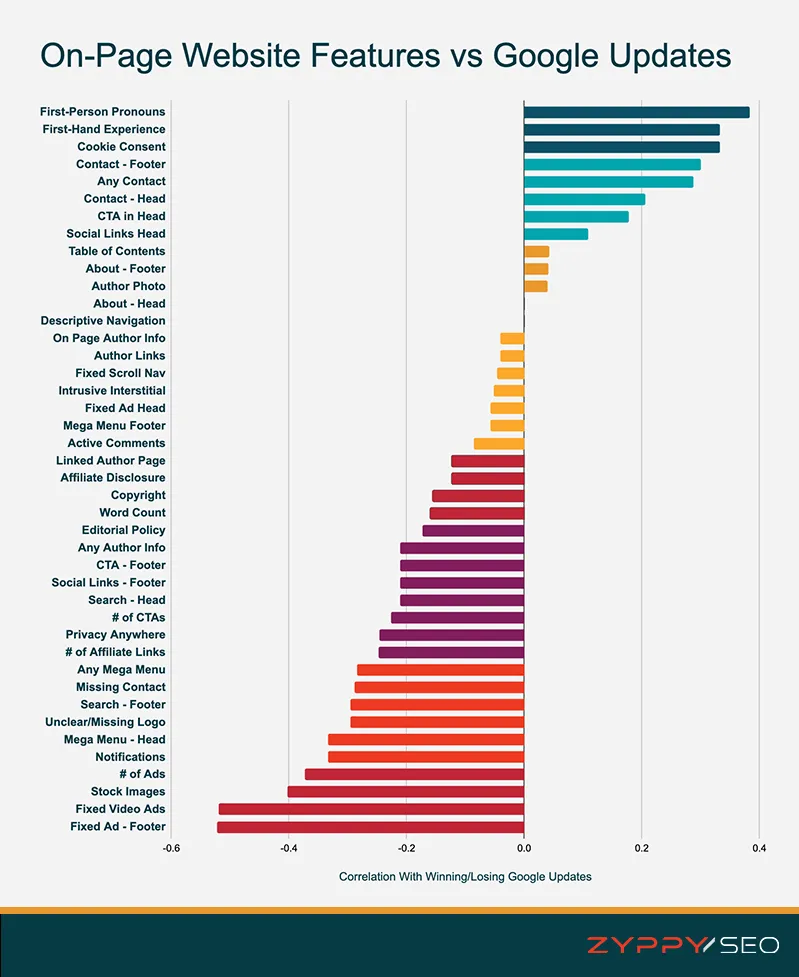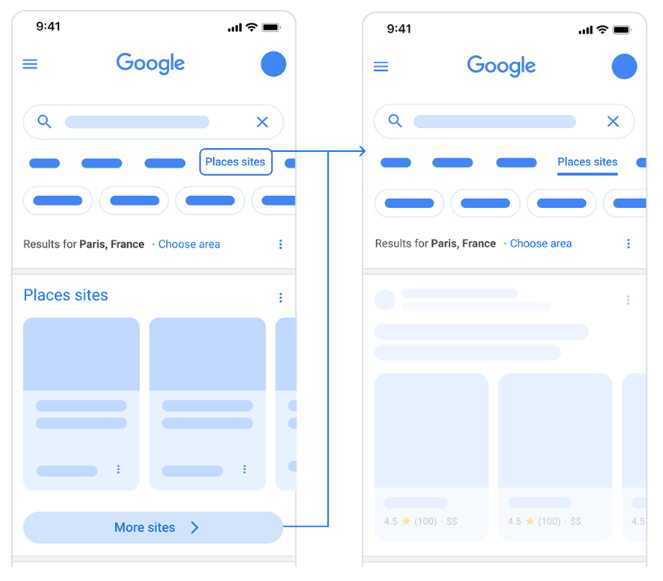Wither the SERP, Winning On-Page Elements, Chips and Carousels

Wither the SERP: Enter AI Search
Research firm Gartner published a prediction: "By 2026, traditional search engine volume will drop 25%, with search marketing losing market share to AI chatbots and other virtual agents." And by 2028 the company says, search traffic may be down by 50%. Designed primarily to get attention, these figures and dates are probably wrong. But the idea behind them is not. There will be traffic erosion, we just don't know how much or how soon. And some AI usage will probably go to Google's SGE and/or Gemini. Will Reynolds of Seer Interactive takes on this topic in a provocative post that poses a thought experiment: "What if people stopped using search engines tomorrow?" Reynolds thinks the discovery experience is already better with "chat-based search." Rather than lament this "day after tomorrow" scenario, he extolls the benefits of AI-based search for marketers and offers tactical advice about what to do – today. He thinks SEO doesn't go away, it evolves (as always) and argues AI agents will be able to learn more about customers than search can, because people ask more complex questions and provide more context. Reynolds says this requires new thinking about content, keywords and headlines. And he encourages use of AI chat on websites to build user engagement and capture first-party data.

Our take:
- Contradicting the Gartner prediction is data that shows ChatGPT's desktop growth is flat. And its app "hasn’t taken off."
- The future isn't a zero-sum game: search vs. AI. Google will survive and evolve; user behavior will change. Search will survive; the "SERP" may not.
- Marketers should plan on relying less on Google going forward anyway; they should diversify and build stronger brands to motivate direct traffic.
What Page Elements Are Truly 'Helpful'?
There were a dizzying number of Google algorithm updates in 2023. This was disruptive for many publishers, which saw traffic losses. Cyrus Shepard at Zyppy SEO sought to understand what and why. He conducted a study, between August and December 2023 of 50 websites (examining 2,500 data points) to determine the impact of UX and on-page SEO factors in search visibility and traffic. He cautions that this is a correlation study and that other variables (user interactions/clicks) may also be at play. His summary graphic is below showing factors associated with winners and losers. He says no single factor appears responsible for gains or losses; "the effects seem to be additive when sites combine features together." The factors he looked at include use of stock images, content with first-person pronouns, privacy mentions, author info, cookie consent, number of ads, contact information and numerous others. On the negative impact side, scrolling ads were "very strongly" correlated with traffic losses. More ads on the page and use of stock images also had negative impacts. On the positive side, demonstrations of personal experience, including use of the first person, were correlated with traffic gains – get ready for lots of "I statements" content going forward. Cookie consent, contact information and social links were also positive variables. Interestingly, word count, among a range of others, had no impact. The study is worth a closer look.

Our take:
- Google has repeatedly advised: stop trying to game the algorithm and create/structure content in a way that meets user expectations.
- Shepard's list can be seen as a kind of directional indicator of what Google thinks is useful and not useful.
- The TL;DR version is: write from experience, show real images, don't "over-SEO" or over-monetize pages with annoying ads.
Chips and Carousels: Google's DMA SERP
We've already taken a preliminary look at Google's new DMA-compliant (tbd) local SERPs in Europe. SEO Gus Pelogia now goes into detail, unpacking the changes Google has implemented in Travel, Products, Jobs and Local. There are several new features being added: Places Sites "refinement chips" (under the search bar), Places Sites carousels at or near the top of the page and additional horizontal carousels. Their purpose is to provide more visibility to directories and "aggregators" (broadly defined). The Digital Markets Act seeks to overcome the ability of large "gatekeepers" to direct traffic to their own services and, the thinking goes, away from competitors' sites – to "level the playing field." Pelogia gives the new features a mixed review. He doesn't expect people to use Place Sites chip refinements, but thinks the “Places Sites” carousels may drive some traffic. On the whole, Pelogia concludes, "It’s still positive that Google’s influence has decreased and there are more opportunities for diverse results." We're now taking a closer look at user behavior and engagement with these pages in the restaurants category. We'll have much more to say later, but early indications suggest the new chips and carousels won't have a meaningful impact on user behavior.

Our take:
- The Places Sites carousel could impact traffic if it ranks consistently high on the page. But if users don't engage Google may demote it. That's a dilemma.
- Google needs to show the EU that these changes will have an impact. It's not yet clear they're "compliant."
- Yet there are some difficult, practical questions about what compliance actually means. Does it amount to some sort of placement guarantee?
Recent Analysis
- Near Memo episode 146: G-SERPs product searches, Google PR around review removals is puffery, Google Maps SGE a hot mess.
- ICYMI: Google LSA Brand Ads = Enshittification, by Mike Blumenthal.
Short Takes
- Google finally lets SMBs to opt-out of 3rd party services (eg, ordering).
- Moz: how to build a credible one-page site (+ other marketing to-dos).
- Claire Carlisle's updated guide to UTM tagging for GBP.
- The recent Google Maps directions spike was a bug.
- Google tests a 'forums' filter in its search bar.
- Conversions: 5 tips from Leadferno's Aaron Weiche.
- Big publishers flood the web with bad product reviews.
- Yelp had record 2023 revenue, 8% review growth yet flat traffic.
- Reddit signs $60M annual licensing deal to train unnamed AI.
- EU: Apple to face ~$540M fine for music streaming behavior.
- USPTO has denied OpenAI a trademark for the term "GPT."
- Air Canada compelled to honor refund policy its AI bot made up.
- Google rolls out 'Shop with AI' feature to some Labs users.
- FTC to make it illegal to impersonate individuals using AI.
- Why Gemini 1.5's "longest context window" is significant.
Listen to our latest podcast.

How can we make this better? Email us with suggestions and recommendations.

